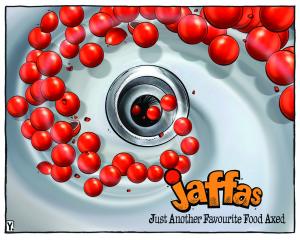
When we speak of religious violence and the threat to democracy, we're drawing a line. On one side of that line, there is something called religious violence.
On the other side, there is something called democracy. In between stands a threat. This threat is not only to our lives, but to our very way of life. By dividing religious violence from democracy, we're dividing ''them'' from ''us''.
When we speak of religious violence and its threat to democracy, we probably call up images of the Twin Towers exploding in New York on 9/11, of the bombed-out hulk of the No30 bus in London on 7/7, or of more recent Islamic State beheadings. ''See,'' we say, ''Religion, particularly their religion, is barbarity. It is a return to the Dark Ages. This is what threatens our democracy''.
To be clear, we absolutely should condemn such things. How could we not?
Yet even as we do, we must recall democracy had its own Reign of Terror. With the beheading of King Louis, the French Revolution announced that: ''The last king should be strangled with the entrails of the last priest.'' This was not the declaration of Europe's Dark Ages. This was the demand of its Age of Enlightenment.
Even so, we might say: ''That was then, this is now. What's past is past.'' Times have changed and so have we. Insofar as our enemies still commit the sorts of atrocities we have renounced, we can comfortably denounce them.
Yet, we must also say even today the United States and its allies continue to do much the same. Recall the images of torture from Abu Ghraib and Guantanamo Bay.
Prisoners were not only stripped of their clothes, but stripped of their humanity. Once dehumanised, they were brutalised. All to keep us safe from them.
As of January 2009, the US officially discontinued its practices of torture. Since then, it has drawn down its forces in Afghanistan and Iraq.
Yet, at the very same time, it has ramped up its drone operations. Afghanistan and Iraq have been liberated. Saddam Hussein and Osama bin Laden have been terminated. Nevertheless, the drone campaign has only accelerated.
Most current operations are ''signature strikes'', whose targets are selected by a ''pattern-of-life analysis'' based on social, geographical, and temporal mapping.
Targets are not specifically identified. They are statistically profiled. Such analysis is a mathematical equation: ''It looks like a duck, walks like a duck, and quacks like a duck, so let's shoot it like a duck.''
In many cases, being in the wrong place at the wrong time is sufficient to be targeted. In the case of the Federally Administered Tribal Areas of Pakistan, simply being a ''military-aged male'' (15-50) is enough to warrant termination.
The result of such calculations?
By modest estimates, there have been more than 1000 strikes. Those strikes have killed about 7900 people. Of those, about 1200 were civilians. More than 200 were children. Fewer than 100 were ''high-value'' terrorist or insurgent leaders.
One civilian killed for every seven combatants killed. Two children killed for every one high-value leader killed. In the case of Baitullah Mehsud, leader of the Taliban in Pakistan, it took 16 strikes over 12 months killing 260 people to finally kill him.
We call this ''precision warfare'' with ''collateral damage''.
Jeremy Waldron - himself a Southland native now teaching law at New York University, and one of Otago's most distinguished alumni - warns us: ''Take away the rule of law and introduce brutality and the infliction of torment, and our personal safety or the safety of our streets is a reproach to us, a tainted and clammy form of satisfaction that we can enjoy only with our consciences turned off.''
Prof Waldron talks about torture carried out by the United States. But he could be talking about drone strikes around the world.
He could even be talking about security policy here in New Zealand. But, whatever he may be talking about, what he is saying - what I am saying - is this:
The greatest threat to democracy is not religious violence itself. That is a danger. It is clear and present, even when it is not imminent.
Even so, that danger is limited. The more pressing and pervasive danger is not their religious violence. It is our undemocratic response. The real threat to democracy is not those people over there. It's you and me, us right here.
If, in response to the unjust aggression of religious violence, we permit ourselves unjust means of prevention and protection, that means - whether we win or lose the geopolitical war against terrorism - we've already lost the moral battle for democracy.
Indeed, we have forfeited. If we do these thing in order to protect ourselves, then, as Prof Waldron puts it, we can enjoy our safety and security only with our consciences turned off.
Dr Derek Woodard-Lehman is a lecturer in theology and public issues at the University of Otago, and is based at St John's Presbyterian Church in Wellington.
He recently presented this article as a public lecture, titled ''Religious violence and the threat to democracy'', at the Beehive.











